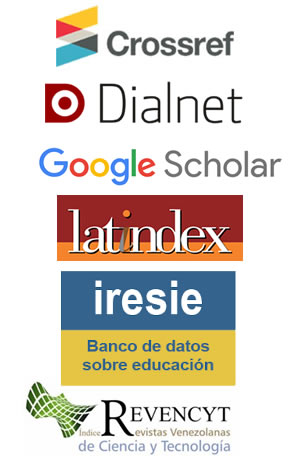Inteligencia Artificial en la Educación Superior: Un Análisis Bibliométrico
Resumen
El avance de las tecnologías de información y comunicación (TICs) ha desarrollado las herramientas de inteligencia artificial, estas permean diferentes dimensiones de la vida de los individuos. La educación superior no es ajena a este proceso de desarrollo tecnológico. El presente estudio tiene como objetivo realizar un análisis bibliométrico publicaciones científicas producidas en torno a la aplicación de inteligencia artificial en la educación superior. Como metodología se utilizó una ecuación de búsqueda de artículos publicados en el periodo 2012-2022, utilizando las palabras clave “artificial intelligence” y “higher education”. Esta ecuación fue aplicada en la base de dato Scopus, de la cual se obtuvo 288 publicaciones, a los que se le aplicaron indicadores bibliométricos para el análisis del historial de publicaciones, citaciones, países, fuentes de publicación, patrocinadores y palabras clave, con la ayuda del sofwarre VOSviewer. Este estudio evidenció un crecimiento en las publicaciones del tema, cuyos países con mayor producción son China y Estados Unidos y la fuente con mayor número de publicaciones es Sustainability Switzerland. El estudio proporcionó una visión cuantitativade las publicaciones existentes en el tema. Al comparar los resultados se evidencia una tendencia creciente en publicaciones centradas en el uso de IA en la educación superior para el proceso de enseñanza y aprendizaje entre docentes y estudiantes.
Citas
Asthana, P., & Hazela, B. (2019). Applications of Machine Learning in Improving Learning Environment. En S. Tanwar, S. Tyagi, & N. Kumar, Multimedia Big Data Computing for IoT Applications. Intelligente Systems Reference Library (Vol. 163, págs. 417-433). Singapore: Springer. doi:https://doi.org/10.1007/978-981-13-8759-3_16
Aznar-Díaz, I., Cáceres-Reche, M. P., & Romero-Rodríguez, J. M. (2018). Indicadores de calidad para evaluar buenas prácticas docentes de mobile learning en Educación Superior. EKS, 19(3), 53-68. doi:https://doi.org/10.14201/eks20181935368
Brika, S. K., Chergui, K., Algamdi, A., Musa, A. A., & Zouagui, R. (2022). E-learning Research Trends in Higher Education in Light of COVID-19: A Bibliometric Analysis. Frontriers in Psychology, 12, 762819. doi:10.3389/fpsyg.2021.762819
Castrillón, O. D., Sarache, W., & Ruiz-Herrera, S. (2020). Predicción del rendimiento académico por medio de ténicas de inteligencia artificial. Formación universitaria, 13(1), 93-102. doi:http://dx.doi.org/10.4067/S0718-50062020000100093
Chiu, T. K., Xia, Q., Zhou, X., Chai, C. S., & Cheng, M. (2023a). Systematic literature review on opportunities, challenges, and future research recomendations of artificial intelligence in education. Computers and Education: Artificial Intelligence, 4, 100118. doi:https://doi.org/10.1016/j.caeai.2022.100118
Comisión Europea. (21 de 06 de 2023). La Comisión Europea. Obtenido de https://commission.europa.eu/about-european-commission_es
Crompton, H., & Burke, D. (2023). Artificial intelligence in higher education: the state of the field. International Journal of Educational Technology in Higher Education, 20. doi:https://doi.org/10.1186/s41239-023-00392-8
Gao, Y., Wong, S. L., Khambari, M. N., Noordin, N. b., & Geng, J. (2022). Sustaining E-Learning Studies in Higher Education: Examination of Scientific Productions in Scopus between 2019 and 2021. Sustainability, 14, 14005. doi:https://doi.org/10.3390/su142114005
Górriz, J. M., Ramírez, J., Ortíz, A., Martínez-Murcia, F. J., Segovia, F., Suckling, J., . . . Ferrández, J. M. (2020). Artificial intelligence within the interplay between natural and artificial computation: Advances in data science, trends and applications. Neurocomputing, 410, 237-270. doi:https://doi.org/10.1016/j.neucom.2020.05.078
Hinojo-Lucena, F. J., Aznar-Díaz, I., Cáceres-Reche, M. P., & Romero-Rodríguez, J. M. (2019). Artificial Intelligence in Higher Education: A Bibliometric Study on its Impact in the Scientific Literature. Education sciences, 9(1), 51. doi: https://doi.org/10.3390/educsci9010051
ITESM . (21 de 06 de 2023). Instituto Tecnológico y de Estudios Superiores de Monterrey. Obtenido de https://tec.mx/es
Jiao, P., Ouyang, F., Zhang, Q., & Alavi, A. H. (2022). Artificial intelligence-enabled prediction model of student academic performance in online engineering education. Artificial Intelligence Review, 55, 6321-6344. doi:https://doi.org/10.1007/s10462-022-10155-y
Kuleto, V., Ilić, M., Dumangiu, M., Ranković, M., Martins, O. M., Păun, D., & Mihoreanu, L. (2021). Exploring Opportunities and Challenges of Artificial Intelligence and Machine Learning in Higher Education Institutions. Sustainability(13), 10424. doi:https://doi.org/10.3390/su131810424
León, G. C., & Viña, S. M. (2017). La inteligencia artificial en la educación superior. Oportunidades y Amenazas. INNOVA Research Journal, 2(8), 412-422. doi: https://doi.org/10.33890/innova.v2.n8.1.2017.399
Li, J., Antonenko, P. D., & Wang, J. (2019). Trends and issues in multimedia learning research in 1996-2016: A bibliometric analysis. Educational Research Review, 28, 100282. doi:https://doi.org/10.1016/j.edurev.2019.100282
Liang, J. C., Hwang, G. J., Chen, M.-R. A., & Darmawansah, D. (2021). Roles and research foci artificial intelligence in language education: an integrated bibliographic analysis and systematic review approach. Interactive Learning Environments. doi:https://doi.org/10.1080/10494820.2021.1958348
Liao, H., Tang, M., Luo, L., Li, C., Chiclana, F., & Zeng, X.-J. (2018). A Bibliometric Analysis and Visualizaion of Medical Big Data Research. Sustainability, 10(1), 166. doi:https://doi.org/10.3390/su10010166
Mutschke, P., Mayr, P., Schaer, P., & Sure, Y. (2011). Science models as value-added services for scholarly information systems. Scientometrics, 89, 349-364. doi:https://doi.org/10.1007/s11192-011-0430-x
Rodríguez-Hernández, C. F., Musso, M., Kyndt, E., & Cascallar , E. (2021). Artificial neural networks in academic performance prediction: Systematic implementation and predictos evaluation. Computers and Education: Artificial Intelligence, 2, 100018. doi:https://doi.org/10.1016/j.caeai.2021.100018
Sánchez-Céspedes, J. M., Rodríguez-Miranda, J., & Salcedo-Parra, O. (2020). Análisis de la producción de publicaciones científicas en inteligencia artificial aplicada a la formulación de políticas públicas. Revista Científica, 39(3), 353-368. doi:https://doi.org/10.14483/23448350.16301
Shukla, A. K., Janmaijaya, M., Abraham, A., & Muhuri, P. K. (2019). Engineering applications of artificial intelligence: A bibliometric analysis of 30 years (1988-2018). Engineering Applications of Artificial Intelligence, 85, 517-532. doi:https://doi.org/10.1016/j.engappai.2019.06.010
Silwattananusarn, T., & Kulkanjanapiban, P. (2022). A text and topic modeling based bibliometric exploration of information science research. IAES International Journal of Artificial Intelligence, 11(3), 1057-1065. doi:http://doi.org/10.11591/ijai.v11.i3.pp1057-1065
UOC. (21 de 06 de 2023). Universitat Oberta de Catalunya. Obtenido de Sobre la UOC: https://www.uoc.edu/portal/es/universitat/coneix/missio/index.html
Wellcome Trust. (21 de 06 de 2023). Who we are. Obtenido de Wellcome Trust: https://wellcome.org/who-we-are
Yang, Q.-F., Lin, C.-J., & Hwang, G.-J. (2021). Research focuses and findings of flipping mathematics classes: a review of journal publications based on the technology-enhanced learning model. Interactive Learning Environments, 29(6), 905-938. doi:https://doi.org/10.1080/10494820.2019.1637351
Zapata-Ros, M. (2018). La universidad inteligente. La transición de los LMS a los Sistemas Inteligentes de Aprendizaje en Educación Superior. Revista de Educación a Distancia, 57(10). doi:http://dx.doi.org/10.6018/red/57/10
Zupic, I., & Čater, T. (2015). Bibliometric Methods in Management and Organization. Organizational Research Methods, 18(3), 429-472. doi:https://doi.org/10.1177/10944281145626
Derechos de autor 2023 Iván Arturo Sánchez Osorio

Esta obra está bajo licencia internacional Creative Commons Reconocimiento-NoComercial 4.0.
Los derechos de autor permiten la protección del material original, y frena la utilización del trabajo ajeno sin permiso. UNESCO IESALC se adhiere a las licencias Creative Commons en la publicación de acceso abierto de la ESS. En concreto, los textos publicados en esta revista están sujetos a una licencia Creative Commons Reconocimiento-NoComercial 4.0 Internacional (CC BY-NC 4.0): Pueden ser copiados, distribuidos y difundidos siempre que se cite al autor, a la revista (Revista Educación Superior y Sociedad) y a la institución que los publica. No se permite el uso comercial. La licencia completa puede consultarse en https://creativecommons.org/licenses/by-nc/4.0/ La ESS requiere que los autores acepten el Copyright Notice como parte del proceso de envío. Los autores conservan todos los derechos.
 Reconocimiento – NoComercial (CC BY-NC 4.0)
Reconocimiento – NoComercial (CC BY-NC 4.0)
Esta revista no aplica ningún tipo de cargo a los autores por la presentación o procesado de los artículos. Los autores de las colaboraciones recibirán acuse de recibo de que el trabajo ha llegado al Equipo Editorial de la Revista.








-literales-100x311.png)
